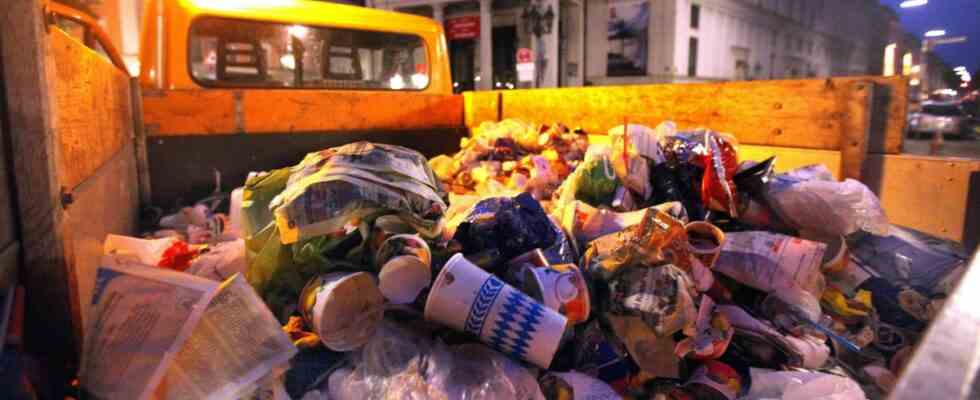The savings target extends to Austria, at least figuratively speaking: by 2035, household waste in Munich is to be reduced by 15 percent per year. That makes 310 kilos for each individual instead of 366 kilos (2019). The amount would fill almost 7,000 goods wagons that are queuing from Munich to Innsbruck, i.e. over a distance of almost 100 kilometers. Municipal consultant Kristina Frank (CSU) opened this bill on Tuesday afternoon, she is also the head of the Munich waste management company (AWM). Together with Lord Mayor Dieter Reiter (SPD), she presented the Zero Waste City concept for the state capital that she had designed in her house. The municipality should no longer produce non-recyclable waste. The city council set this goal two years ago.
At their first joint press conference, municipal officer Kristina Frank and Mayor Dieter Reiter presented the zero-waste concept.
(Photo: Stephan Rumpf)
The status quo, which was last recorded in a statistic before the pandemic, is anything but “sparkling”, says Frank. The people of Munich produced 720,000 tons of “municipal waste” in 2019, and the quantities have increased significantly since Corona. 43 percent of it ended up in the black residual waste bin. Including a lot that doesn’t belong in it: clothes, boxes and also “extremely much organic waste”, lists the AWM director. This residual waste is the “most problematic because it goes to thermal recycling”, i.e. incineration, and thus breaks the noble cycle of recycling. So how to get off it was the task of the city council to the address of the AWM.
A catalog of 400 measures has emerged from consultations with science, specifically the Wuppertal Institute, a non-profit research facility for climate, environment and energy, the Munich association rehab republic for more sustainability and Munich residents who took part in corresponding workshops in 2021 , which distilled Frank’s Authority to 100. Maxime: Avoid wherever possible. And what has to go in the bin – please put it in the right one.
The fields of action ultimately extend to all areas of life: Frank also counts the municipal departments and private companies, where 50 percent less waste is to be produced. Interjection from the mayor: “Printed e-mails, for example, are not the idea of digitization. But lived practice.” In the commercial sector, there is a need for more systematic collection of waste from production and more recycling. The same basically applies to the construction sector.
“We don’t have any data at the moment,” says Frank. “The trade can choose who picks up its garbage, usually the cheapest provider.” Reiter thinks aloud about “regulations” and procurement guidelines as a municipal design option. In the construction sector, Franks Haus also has the collection of Munich rubble materials in mind – also in a so-called building materials library, which shows “how the material flows run”, what is transported away and where. And which materials can be reused. For Frank, this is one of “40 top measures”.
There should also be “wastefluencers” on social media
This package also includes the expansion of the second-hand department store in Hall 2, which is to receive pop-up shops in other quarters, better education in as many languages as possible via a “zero waste app”, the pilot test from 2024 with the yellow bin for Packaging waste and the introduction of an unpackaged weekly market on a trial basis. As at the Wiesn, attention should be paid to reusable tableware at events in the city and in urban areas, up to and including marathons. There are said to be zero-waste schools, a block of streets where all the neighbors are committed to the idea, large housing complexes, platforms for textile roundabouts, and even “waste influencers” on social media.
This Thursday, the municipal committee in the city council will vote on the detailed concept. “They already have my vote,” as does his parliamentary group, Reiter said to Frank at the first joint press conference between the two. The implementation is expected to cost 1.8 million euros starting in 2023. Five to seven positions would still be needed for a specialist group, three of which are directly linked to the AWM management, says Frank.
With all the zeal for recycling, the question then arises at the press conference as to whether it is not the case, as some fear: the people of Munich sort and sort, and in the end everything is thrown together? Passionate resistance from the municipal officer: everything stays on track. The only open flank is the packaging waste, for the disposal of which in Germany the private-sector dual system is responsible by law. “I can’t say for them where the plastic goes because they don’t provide any information about it.”

